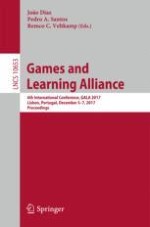2017 | Buch
Games and Learning Alliance
6th International Conference, GALA 2017, Lisbon, Portugal, December 5–7, 2017, Proceedings
herausgegeben von: João Dias, Pedro A. Santos, Remco C. Veltkamp
Verlag: Springer International Publishing
Buchreihe : Lecture Notes in Computer Science
